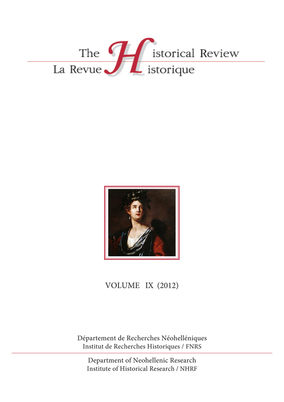Liberty in the Hellenic Nomarchy of 1806
Part of : The Historical Review ; Vol.6, No.1, 2009, pages 165-186
Issue:
Pages:
165-186
Author:
Abstract:
According to the anonymous author of the Hellenic Nomarchy, the establishment and preservation of liberty requires a Nomarchic form of government. In a Nomarchy, Anonymous tells us, all are free. But what does Anonymous mean by freedom or liberty? Through a careful reading of the text I show that we can attribute to Anonymous a distinction between three conceptions of liberty – psychological liberty (a soul governed by reason); personal liberty (obedience to one’s own will and noninterference from the commanding will of another); and political liberty (participation in the law-making process, or political participation). I argue that, for Anonymous, a person enjoys liberty when he has a rational soul (psychological freedom) and is thus able to participate properly in the law-making process (political freedom), thereby securing for himself a sphere of immunity in which he can exercise his psychological freedom and live in accordance with his own will (personal liberty). But is Anonymous right to claim that all are free in a Nomarchy? The question arises because of Anonymous’ endorsement of majoritarianism in matters of legislation. This endorsement seems to entail that the freedom of minorities is disregarded in a Nomarchy. However, I show that this is not the case. Anonymous can be interpreted as incorporating into the structure of the Nomarchic state certain measures that protect the freedom of minorities.
Subject:
Subject (LC):
Notes:
856:https://ejournals.epublishing.ekt.gr/index.php/historicalReview/article/view/4025, DOI: http://dx.doi.org/10.12681/hr.243
Electronic Resources:




